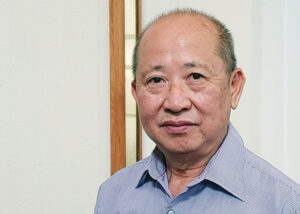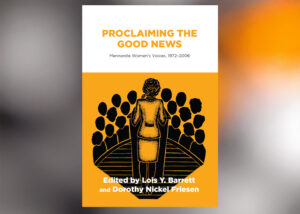While people and governments alike are sprinting to mitigate the current crisis of COVID-19, David Driedger is starting to run the marathon of addressing its long-term implications.
Driedger, associate minister at First Mennonite Church in Winnipeg, wrote an open letter calling on all levels of Canadian government to create significant systemic changes now and in the critical time following the pandemic, to care for the most vulnerable in society. The petition, which he worked on with numerous other ecumenical church leaders and theologians in Winnipeg, is entitled “Canadian churches for care and change in the time of COVID-19” and was published online (bit.ly/2w8Vtpc) on March 27.
People react differently in times of uncertainty and chaos. Driedger’s response is to try to understand what’s happening. “As soon as I saw how significant some of the economic implications of this [pandemic] were going to be, it really . . . just felt like a further exposure of a system that already exposes the vulnerable. It was sort of a stark realization that this is a system that can’t stop,” he says.
The global economic system is not set up to care for vulnerable people, and certain groups suffer under this system even in normal times, Driedger says. But as COVID-19 explodes across Europe and North America, the alarming impact on people’s economic stability is becoming much more widespread and the reality of the world’s economic structure is being laid bare.
“It just continues to baffle me that . . . there’s still consistently no conversation around, say, an immediate one-time taxation of certain amounts of wealth for the purposes of redistribution, to help those most directly affected by it.”
The petition asks the federal government to allocate funds for emergency shelters, revoke its ban on asylum seekers, protect prisoners, absolve debts, redistribute wealth and stop subsidizing oil companies. It also advocates for providing more resources and improving conditions for Indigenous communities that are at a higher risk than other Canadians due to inadequate housing, water and medical services. “COVID-19 has already changed the global landscape. We are asking that we do not return to a system that was increasingly unjust and never sustainable,” the petition states.
Jane Barter, an Anglican priest and professor at the University of Winnipeg, was also closely involved with the project. Both she and Driedger involved other people from their networks, and the project took on a more collective form.
“The hope is that in the midst of us all trying to take care of our own personal situations, we don’t lose sight of some of the larger questions as well, and figure out how to hold the right people accountable at the right time,” he says.
But why is this an issue of faith? The petition reads: “As Christians and churches committed to the gospel, we are required to prioritize the vulnerable over the demands of profit.”
Driedger sees this responsibility rooted deeply in biblical theology. Although he has been shaped by liberation theology and the writings of several black theologians, it’s ultimately biblical books like Isaiah and the gospels that clearly proclaim this message.
The document begins with a Matthew text: “Truly I tell you, just as you did it to one of the least of these among you, you did it to me.” It draws on the “Jubilee” traditions of rest and redistribution found in Leviticus.
Driedger says the theme even showed up in the text he was given to preach on recently, the parable of the rich man and Lazarus from Luke, in which a wealthy man is severely judged for his continued disregard of someone who suffered before his eyes.
However, many theological traditions haven’t been shaped this way because most churches “have been sort of a passive participant in our systems because we’ve benefited well enough from them, and we’ve gotten quite comfortable with them over time,” he says.
So, while the petition publishers hope it gains attention and a multitude of signatures, and that it elicits some short-term action, they also want churches to work through the document—of which a longer version with linked resources and readings is available through a link on the online petition—as a long-term project. “It’s the longer document that I want to see congregations engage with as a study document, as something that can shape some formative and long-term thinking as well,” he says.
Driedger has also been involved with Budget for All, a Winnipeg coalition responding to City of Winnipeg budget cuts affecting social services, and he organized a presentation on peace and policing in Winnipeg through his church. “It just feels like the best way to stay as close to the gospel as possible . . . is to remain as attentive as possible to those who are most vulnerable among us,” he says.
This article appears in the April 13, 2020 print issue, with the headline “Care and change amid COVID-19.” Do you have a story idea about Mennonites in Manitoba? Send it to Nicolien Klassen-Wiebe at mb@canadianmennonite.org.
Related stories:
Musician offers online singalong
Saskatchewan health-care professionals reflect on COVID-19
Nourishing body, mind and spirit
Grebelites continue in community amid COVID-19 separation
COVID-19 has significant impact for MDS








Leave a Reply
You must be logged in to post a comment.